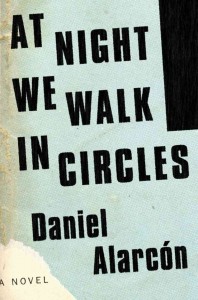Prophesy, deceit, and desperation swirl seamlessly throughout Alarcón’s latest novel, At Night We Walk in Circles. Under the gray skies of this phantom South American city, which based on what we know about Alarcón can be assumed to be Líma, we meet Nelson, a love-sick rookie actor and his troubled mentor, Henry. Deep into the Andes they take us, along with their forlorn comrade Patalarga, to revive Diciembre, a once revolutionary theater collective.
Nelson is the newest member of Diciembre. He’s imaginative like a child yet placidly complacent and dissatisfied with most of what’s around him — his dreams of escaping to the US have been shattered. He’s a drifter who longs for reverence as a political actor and his relationship with wistful Ixta, his former college sweetheart, is an endless boomerang. He glides through life with broken purpose.
Luckily, Henry finds Nelson’s brokenness endearing. Henry previously reigned as the city’s magnate political playwright and is now an urbane divorced high school science teacher. It’s easy to not take him too seriously. He’s awkward, cocky and overwhelmed with secrets. However, it’s with vulnerable enthusiasm that he gathers Patalarga and Nelson for rehearsals of The Idiot President, the play that brought Henry’s career to a “premature close” and put him in prison decades ago. The play features an inane and conceited president who hires a different citizen everyday to be his servant. There’s nothing explicitly foreboding about this farce, just that for no reason it’s decidedly cursed from the beginning. And as they go forward onto their tour, the prospect of peril hangs like the fog over the Andes.
They perform in small, cold mountain towns, their shows eliciting standing ovations and unexpected gestures of gratefulness. Everything runs so smoothly, so perfectly it can only be foreboding. “I feel more comfortable when there’s less oxygen” says Henry as they go deeper into the Andes and higher in elevation. And as the troupe’s penchant for coco leaves grows so does their bad luck.
They enter eerie T—, a taunting “village without men”, an “idyllic mountain dreamscape” and the hometown of Henry’s old cellmate and former lover, Rogelio who died in prison. In effort to protect its inhabitants, the narrator never discloses T—’s real name. To Henry, T— isn’t just a stop on the tour, it’s a “flashing light or a star”, it’s no more a destination than it is a purgative remedy for Henry’s haunting heartbreak.
Yet T— is where their tour ends. A fistfight with Rogelio’s brother, Jamie and an unusual meeting with his senile mother, Anabel is the kindling for Nelson’s doom. While Henry and Patalarga return home, Jamie, a scheming drug dealer, convinces Nelson to move into Rogelio’s childhood bedroom. It doesn’t take long for Nelson to realize that he’s been trapped and forced to act out a cursed spectacle.
Henry and Nelson’s relationship is a collision of desires. They’re both obsessed and traumatized by their heartbreaks, yet they’re willing to endanger themselves and the lives of others in order to achieve some solace or antidote for their fervor. Most of the story is a terrifying procession of dangerously ravenous quests for romance. Henry is Nelson’s hero and prophet, whose own lust for Rogelio foreshadows the lengths Nelson will go to win back Ixta. It’s cinematic — a dark slapstick to watch these characters so deluded by their desires create such hazardous situations. Henry is a failed bohemian Robin Hood who once furiously dreamed of delivering political art and theater to the masses. Now he gets off on afflicting his “uneasy countenance” on the people that matter to him.
Henry is vaguely based on Peruvian director and writer, Walter Ventosilla, whose play The Idiot Ruler and novel Luis Bandolero Luis both greatly influence At Night We Walk in Circles. Just like in Luis Bandolero Luis, the narrator of Alarcon’s novel swims under the pages rarely rising up for air for most of the novel. It’s only in the last third that we actually meet him, an unnamed journalist who takes deep to heart every detail of Nelson, Henry and Ixta’s lives. His voice remains the blinking eye of the storm, a sliver of normalcy in this vast scope of despair and torment. Without the anonymous narrator’s perspective we might not be able to see the glimmerings of tenderheartedness in these egotistic characters. He’s a sharp investigator, immersing and nearly derailing himself and the readers, deluding us all into mistaking ourselves for one of these actors ruthlessly playing out their emotions.
Julie Morse (@JulieMorse16) is a poetry teacher living in San Francisco.
This post may contain affiliate links.







